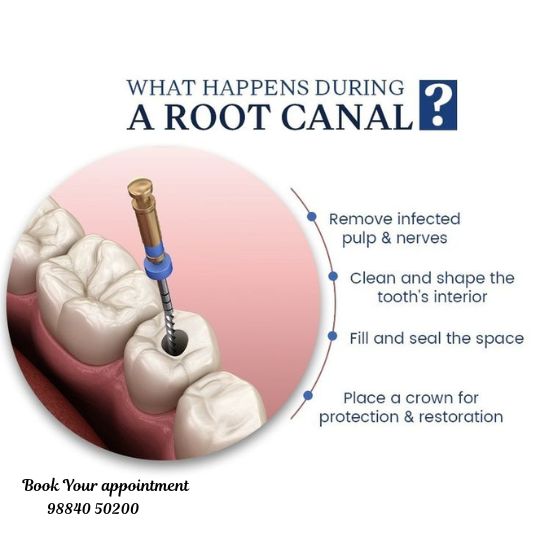+918048127677

This is your website preview.
Currently it only shows your basic business info. Start adding relevant business details such as description, images and products or services to gain your customers attention by using Boost 360 android app / iOS App / web portal.
A root canal is a dental procedure used to treat i...

A root canal is a dental procedure used to treat infection or damage within the pulp (the soft tissue inside a tooth that contains nerves, blood vessels, and connective tissue). Here's an overview of the process: Diagnosis: The dentist or endodontist (a specialist in root canal treatment) diagnoses the need for a root canal based on symptoms (such as pain, prolonged sensitivity to heat or cold, tenderness, swelling, or discoloration) and through examination and X-rays. Anesthesia: Local anesthesia is administered to numb the affected tooth and surrounding area to ensure the patient does not feel pain during the procedure. Access Opening: The dentist creates an opening in the crown of the tooth to access the pulp chamber and root canals. Pulp Removal: The diseased or infected pulp is carefully removed from the pulp chamber and root canals. Cleaning and Shaping: The inside of the tooth is cleaned, disinfected, and shaped to allow for filling. This step may involve the use of special instruments and antibacterial solutions. Filling: The cleaned and shaped root canals are filled with a biocompatible material (usually gutta-percha) to seal them and prevent future infection. A temporary filling may be placed to close the opening. Restoration: After the root canal is completed, the tooth needs to be restored to its full function and shape. This typically involves placing a crown or other type of restoration to protect the tooth and restore its appearance. Follow-up: The dentist schedules follow-up appointments to ensure the tooth is healing properly and to check the success of the root canal treatment. Root canal treatment can save a tooth that would otherwise need to be extracted and helps alleviate pain and infection. Proper aftercare, including good oral hygiene and regular dental check-ups, is essential to ensure the long-term success of the treated tooth.

